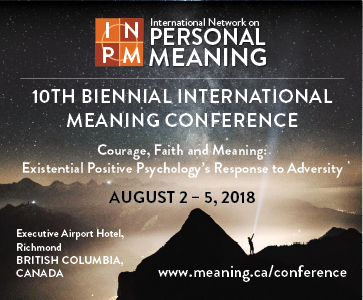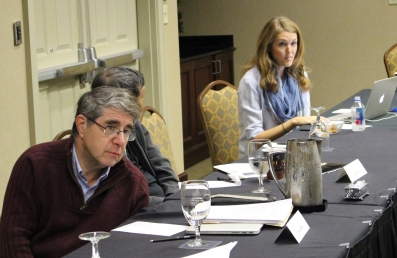
This is a two part series. Part One, “Anxiety and Loss”, posted yesterday.
Part Two: Rationality and the Anxiety of Meaning
While one formal characteristic of human life—that of desires and ends—prompts the anxiety of loss, we can see now how the other, rationality, renders us vulnerable to the anxiety of meaning. Rationality involves reflection on our ends that in turn can bring about the anxiety of meaning. In reflecting on them we may either approve or disapprove of them. We may, for example, take our ends to be valuable and thus delight in the bliss of pursuing conscious valuable life. But we may also fall into despair in realizing that ends we held valuable and labored to secure are in fact of no value. Thus, one may realize that a project one was committed to (e.g., promoting communism or nation-building), is, in fact, misguided and valueless; such realization can be devastating. However, such realizations do not in themselves constitute the anxiety of meaning. Rather than residing in the realization that one end or another has no value, the anxiety of meaning consists in recognizing that such realization is always a possibility; that just as I realize now that my enormous efforts to become a Sudoku champion were in vain because I see no value in being a Sudoku champion, similarly, it is always possible that I may realize that my other ends are of no value. Even worse, realizing we cannot ground values in reasons, leads us to recognize that value and worth cannot be secured and fortified; that it is always possible to lose sight of that which once seemed of worth to us. For, after all, rational justifications are finite, and if we are asked to provide them in support of the value we see in our ends, they will eventually give out and we are left without rational grounds to hold these ends valuable. Our very capacity to rationally reflect on the value of our ends, then, leads to the realization that our values are never fully grounded and secure.
If the story of Job symbolizes loss, Ecclesiastes epitomizes meaninglessness. When King Solomon lamented “vanity of vanities; all is vanity” he was a man with as much confidence, achievement and possession as one can hope for. Hence, clearly, he laments not the loss of that which he loves and values but rather the absence of worth and value; the waning and depletion of value from the world. In the absence of value, King Solomon asks “(w)hat profit hath a man of all his labour which he taketh under the sun?” This question expresses the anxiety over whether what we toil for might be without worth at all, and therefore pointless.
So far we have seen that the anxieties of loss and meaning are bound up with our rational being; they are not mere accidents, but they are also not essential. They are, for lack of a better term, un-essential or un-rational aspects of human life; connected to our rationality through rationality’s negation—and hence internally linked to rationality and its intrinsic shortcomings. [1] With an understanding of the shared un-rational nature of these anxieties, we can now see how they relate deeply to one other: each anxiety both excludes the other and promises redemption from the other. A person agonizingly anxious of loss may envy her stoic friend who sees less value in his ends and consequently suffers less from the prospects of their loss. And vice versa, he who depressively conceives of no meaning in life may wish for his friend’s deep immersion in her values. Each sees hope in the condition of the other; the one wishes to value more, the other to value less, and we can imagine one oscillating between the two poles of anxiety in a wish to find the middle way between them. This is the doctrine of the mean in relation to the form of our practical life.
Accordingly, it appears, the human lot is at best to find the mean between these poles, or at least to oscillate gently between them. We may think about finding the right balance between the two anxieties as a virtue—a mean between two vices. But what assures us that we will not lose our grip of the mean and slip back to one of the extremes? Even in maintaining balance, we are vulnerable to the anxiety that nothing secures this balanced state; that it is forever subject to changes beyond our control. A famous Chasidic proverb by Rabi Nachman of Breslav goes “the whole world in its entirety is a very narrow bridge.” If a man spends his life on a narrow bridge, leading nowhere (it is the entire world, after all), it appears that there is no better thing for him to do than to maintain balance and forever live in fear of falling down to the abyss of either of the anxieties. Is this truly the best we can hope for? Is there no way to transcend this precariousness human condition?
The rest of Rabi Nachman’s proverb may suggest that there is another way. Here is the full proverb:
The whole world in its entirety is a very narrow bridge.
And the most important thing is not to be afraid at all.
The transcendence offered by Rabi Nachman is one in which there is a sharp awareness of the inescapable human condition, but at the same time, an insistence that we must not live in fear. The promise resides not in running away from the human condition but in a cleared-eyed recognition of it. But once we recognize it, how can we avoid being afraid?
I shall conclude with an answer suggested by Job and King Solomon. Job, right after having lost almost all his loved ones and earthly possessions, says: “Naked came I out of my mother’s womb, and naked shall I return thither: the Lord gave, and the Lord hath taken away; blessed be the name of the Lord.” Coping with loss, and the possibility of loss, comes with an awareness that all of it comes from God and is thanks to God. This awareness allows one to see a point in the loss since it is not a mere outcome of human fragility but a part of God’s intention. It is by virtue of realizing this that one can overcome, or at least live with, the anxiety of loss: the loss is one part of God’s plan and hence, though it may torment us, it is a constituent of the good. As long as we trust in God, we are not afraid. King Solomon’s lamentations end with the words “Let us hear the conclusion of the whole matter: Fear God, and keep his commandments: for this is the whole of man.” In other words, we can feel safe that the world and our ends are valuable if we trust in God. It is through the fear of God that we are freed of our anxiety of meaning. The ends given by God’s commandments are of value we cannot doubt as long as we have faith. In faith, the world cannot be bereft of value and meaning. Through faith, Rabi Nachman’s imperative is fulfilled. One can stand in the world, which is nothing but narrow bridge, with confidence, and without fear of being engulfed by the two essential human anxieties.
[1] I am here referring, unfortunately quite crudely, to an idea developed by professor Irad Kimhi. I hope to make more justice to his thoughts in future posts.
Amichai Amit is PhD student in philosophy at the University of Chicago. His research concerns the foundations of ethics and normativity. He also has strong interests in the history of philosophy (ancient and German idealism) and existentialism. He previously received an MA in Philosophy from Tel-Aviv University.





 Click the link below to hear our scholar and philosopher Josef Stern discuss Jewish medieval philosophy, his approach as a skeptical reader of Maimonides, multiple levels of meaning into the Akedah or “binding of Isaac”, and how he anticipates working with scholars in our project across the fields of philosophy, theology, and psychology will impact his approach to thinking about ideas of happiness, meaning, and perplexity.
Click the link below to hear our scholar and philosopher Josef Stern discuss Jewish medieval philosophy, his approach as a skeptical reader of Maimonides, multiple levels of meaning into the Akedah or “binding of Isaac”, and how he anticipates working with scholars in our project across the fields of philosophy, theology, and psychology will impact his approach to thinking about ideas of happiness, meaning, and perplexity.